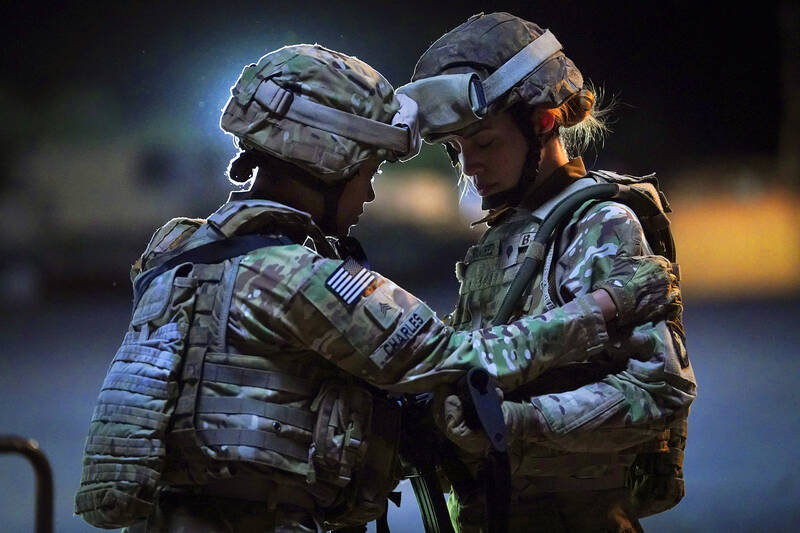Even for a film titled My Dead Friend Zoe, the opening scenes of Kyle Hausmann-Stoke’s movie have a startling rhythm.
First, two female American soldiers are riding in a Humvee in Afghanistan 2016 blasting Rihanna’s Umbrella. They are clearly friends, and more concerned with the music coming through loudly than enemy fire. Zoe (Natalie Morales) tells Merit (Sonequa Martin-Green) that if they ever set foot in “some dopy group therapy,” to please kill her.
Cut to years later, they’re sitting in a counseling meeting for veterans and Morales’ character has a sour look at her face. She turns to her friend: “Did we survive the dumbest war of all time just to sit here all broken and kumbaya and ouchie-my-feelings?”

Photo: AP
But after this rush of cavalier soldiering and bitter sarcasm comes a sobering moment. Merit blinks her eyes and is instead staring at an empty chair. Zoe isn’t there at all.
My Dead Friend Zoe, co-starring Morgan Freeman and Ed Harris, confronts a dark reality of post-combat struggle with as much humor and playfulness as it does trauma and sorrow. It comes from a real place, and you can tell. Hausmann-Stoke is himself a veteran and My Dead Friend Zoe is dedicated to a pair of his platoon mates who killed themselves. The opening titles note the film was “inspired by a true story.”
Audience disinterest has characterized many, though not all, of the films about the Iraq and Afghanistan wars, and the output has pretty much dried up over the years. My Dead Friend Zoe feels like it was made with an awareness of that trend and as a rebuke to it.

Photo: AP
This is an often breezy and funny movie for what, on paper, is a difficult and dark story. But the comic tone of My Dead Friend Zoe is, itself, a spirited rejection to not just the heaviness of many films about veterans but of the grief that can consume those who have dealt with loss and post-traumatic stress disorder.
Throughout the film, Zoe appears only to Merit, ala Brad Pitt in Fight Club, singing alongside her as she drives or impatiently waiting for Merit to come home from a run. Whether this, following some unspecified end to Zoe, is a healthy thing or not for Merit is increasingly in doubt. Merit needs to cling to her friend, or her memory of her. But Zoe also rolls her eyes at any suggestion of talking through her feelings. Zoe, as an apparition, is both the cause and relief to her pain.
There are a few other points of view, courtesy of two of our finest actors. Freeman plays the counselor of Merit’s mandatory group sessions. He refuses to let Zoe coast. To pressure her to share and participate, he threatens withholding Zoe’s certification.

Photo: AP
Meanwhile, Merit’s grandfather, Dale (Harris), a Vietnam vet, has just been diagnosed with early Alzheimer’s. Merit is tasked with keeping an eye on him at his rural lakeside cabin and helping him into a retirement community — a prospect that infuriates him. As Merit’s original inspiration for joining the army, Dale — stubborn and tight-lipped — epitomizes an earlier generation of soldier.
In toggling between the present and wartime flashbacks, My Dead Friend Zoe is sometimes a bumpy ride. The interplay between Merit and Zoe also shifts, beginning more like a buddy comedy and veering toward horror-film haunting, especially when Merit hesitantly agrees to a date with a worker at the prospective retirement home (Utkarsh Ambudkar).
But the movie’s earnestness carries it through these less smooth moments. So does the cast. Any opportunity to see Freeman or Harris, still at the top of their games, is a chance to be treasured. Freeman is typically sage and Harris characteristically fiery. But the leads are even better. Morales is at her finest as a cynical soldier, devoted to her friend but little else. And with compelling poise, Martin-Green (The Walking Dead) carries a movie that at times can feel scattershot but never not sincere.

Last week, the the National Immigration Agency (NIA) told the legislature that more than 10,000 naturalized Taiwanese citizens from the People’s Republic of China (PRC) risked having their citizenship revoked if they failed to provide proof that they had renounced their Chinese household registration within the next three months. Renunciation is required under the Act Governing Relations Between the People of the Taiwan Area and the Mainland Area (臺灣地區與大陸地區人民關係條例), as amended in 2004, though it was only a legal requirement after 2000. Prior to that, it had been only an administrative requirement since the Nationality Act (國籍法) was established in

Three big changes have transformed the landscape of Taiwan’s local patronage factions: Increasing Democratic Progressive Party (DPP) involvement, rising new factions and the Chinese Nationalist Party’s (KMT) significantly weakened control. GREEN FACTIONS It is said that “south of the Zhuoshui River (濁水溪), there is no blue-green divide,” meaning that from Yunlin County south there is no difference between KMT and DPP politicians. This is not always true, but there is more than a grain of truth to it. Traditionally, DPP factions are viewed as national entities, with their primary function to secure plum positions in the party and government. This is not unusual

The other day, a friend decided to playfully name our individual roles within the group: planner, emotional support, and so on. I was the fault-finder — or, as she put it, “the grumpy teenager” — who points out problems, but doesn’t suggest alternatives. She was only kidding around, but she struck at an insecurity I have: that I’m unacceptably, intolerably negative. My first instinct is to stress-test ideas for potential flaws. This critical tendency serves me well professionally, and feels true to who I am. If I don’t enjoy a film, for example, I don’t swallow my opinion. But I sometimes worry

US President Donald Trump’s bid to take back control of the Panama Canal has put his counterpart Jose Raul Mulino in a difficult position and revived fears in the Central American country that US military bases will return. After Trump vowed to reclaim the interoceanic waterway from Chinese influence, US Defense Secretary Pete Hegseth signed an agreement with the Mulino administration last week for the US to deploy troops in areas adjacent to the canal. For more than two decades, after handing over control of the strategically vital waterway to Panama in 1999 and dismantling the bases that protected it, Washington has